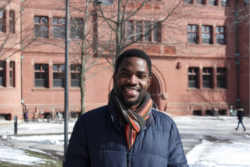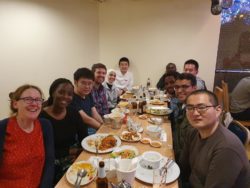Expanding my horizons on the Water, Sanitation and Health MSc
This blog is by Chanda Singoyi a student on the Water, Sanitation and Health Engineering MSc (2021-2022 cohort).
Growing up in Zambia, I was always aware of the water resources in my environment, culture, and politics. Rivers are depicted in our political propaganda as an untapped resource that will end our energy and drinking water crises, or as disease-filled cesspools to be rehabilitated as election promises. From a young age, I understood early on how free flowing rivers can generate electricity for our daily use and was fascinated by the multi-faceted relationship people had with water resources. Later, it was my academic pursuits that fostered this fascination and made my life’s purpose clear to me – to better understand the relationship between humans and water and to be at the forefront of engineering solutions in my country, and in communities around the world facing water challenges.

Picture of Chanda in the snow in Leeds
My time at the University of Leeds has been nothing but rewarding. I decided to pursue the MSc in Water, Sanitation and Health (WASH) engineering programme because I wanted not only to explore concepts of water supply and wastewater management, but to consider their impact on the wellbeing and livelihoods of societies. Despite having taken the programme in the middle of a pandemic, the lectures have been well structured and balanced, adopting a hybrid system that allowed me to meet and interact with my peers and instructors, in-person, and engage in collaborative work. The pandemic also provided a perfect opportunity to easily book online sessions with instructors and researchers around the world, to work on a multitude of tasks, from reviewing a thesis report to clarifying course material for an assignment.
Regarding the modules, I was fascinated with the Key Issues in International Health which is run in conjunction with the Nuffield Centre for International Health and Development. Coming from a technical background, the course was challenging, however, I learned a lot about public health and how social systems contribute to the overall wellbeing of communities. Concepts surrounding equity in gender and health, maternal, neonatal and child health, and epidemiology are all areas I hadn’t encountered in my previous engineering background and career. Similarly, another course I thoroughly enjoyed was the Engineering for Public Health which brought many of the concepts from Key Issues to International Health into perspective and emphasised the role of engineers in developing systems to improve public health. In the many courses I have taken, leading researchers and industry professionals have been invited to teach about the work they do and the current state of WASH around the globe. Most notable guest lectures include Nancy Balfour, the former Chief of WASH at UNICEF, and Martin Gambrill, a Lead Water and Sanitation Specialist in the World Bank’s Water Global Practice. These lectures have been helpful in gaining an understanding of the full spectrum of the WASH industry and help students reflect on career paths upon completing of the programme.

Picture of WASH MSc students out at meal
For my dissertation, I am working with Professor Barbara Evans and Mariam Zaquot in exploring the WASH sector in Zambia and how the political landscape has influenced the state of the sector. I intend to evaluate the various WASH stakeholders, including regulatory institutions and explore intervention pipelines that could improve the WASH service delivery within the country. Upon completion of the MSc in WASH programme, I intend to work for a water consulting firm or multinational organisation that helps solve water challenges, especially in remote parts of the globe.
